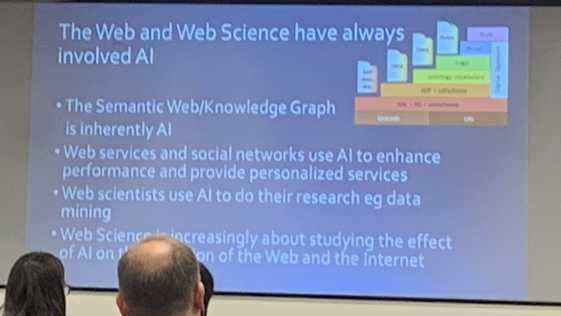What is Web-Science
The primary way through which Web Science works are sought to be progressed, is moreover via WebCivics activities, as is distinct to the creation of the specifically branded solutions ecosystem that is intended to support the production of technology for the public good via the WebizenAlliance and related works that are moreover about the PCT-WebizenTechStack specifically (ie: [[Webizen 3.0]], [[Webizen 3.5]], etc), whilst being informed by WebCivics / WebScience works seek to address the broader [[SocialFactors]] and provide practical outcomes that can be made to work via Webizen systems, and others that seek to support the values.
What is Web Science?

Below is a definition of 'Web Science' as provided by OpenAI .
Web Science is an interdisciplinary field that studies the social, technical, and economic aspects of the World Wide Web and the internet. It combines elements of computer science, information science, sociology, economics, and other disciplines to understand the complex social, technical, and economic systems that make up the web.
Web Science researchers study topics such as the structure and evolution of the web, the impact of the web on society and culture, and the ways in which the web can be used to support research, education, and business. They also study the technical and social challenges associated with building and maintaining the web, such as privacy, security, and misinformation.
Web Science is a relatively new field, and it is still evolving. However, it is an important area of study, as the web and the internet have become increasingly central to many aspects of modern life, and understanding their impact and potential is crucial for both academia and society as a whole.
Web Science research often involves the use of computational methods and data analysis to study the web and the internet. This can include the use of machine learning algorithms, network analysis techniques, and data visualization tools to understand patterns and trends on the web.
Web Science also often involves the use of qualitative methods, such as interviews and surveys, to understand the human experience of the web. This can include studying the ways in which people use the web, the impact of the web on society and culture, and the ways in which people interact with each other online.
Web Science research often focuses on a range of different domains, including social media, e-commerce, online education, and health care. It is an interdisciplinary field, and researchers often collaborate with experts from a variety of fields, such as computer science, sociology, and economics, to tackle complex problems and issues related to the web.
Overall, Web Science is a broad and rapidly evolving field, with a focus on understanding the complex social, technical, and economic systems that make up the web, and the ways in which these systems impact society and individuals.
A Quick Introduction to the concept of Social Machines
The Luminary in the field, James Hendler, wrote a book about "Social Machines: The Coming Collision of Artificial Intelligence, Social Networking, and Humanity" .
Below is a video that is available in relation to his works sometime ago, that may make more sense to others now...
IMHO: Generally speaking, the field of work that is structured to in-turn make use of the deep knowledge of different diciplinary areas of thoughtful consideration, as to support the growth of a form of intentional design - in activities that relate to the fabrication of technologies that societies become inextricably linked to, is described as 'Web Science'.
Web Science works, is in-particular - a significant part of the field of work of Web Civics.
One of the greatest areas of 'Web Science' is AI and in-turn also, the work i've been doing that is in-turn instrumental to the architecture of Webizen, as to support HumanCentricDigitalIdentity. Nonetheless, the underlying nature of Webizen is that it is a form of Social Machine that is sought to be intentionally designed to provide the sorts of Artificial Minds that we want, rather than providing an opportunity to be influenced by harmful robots.